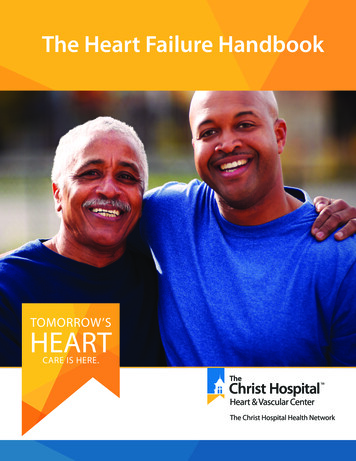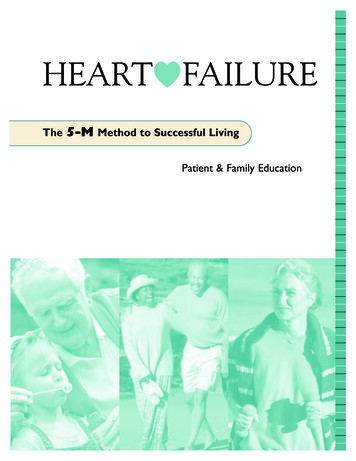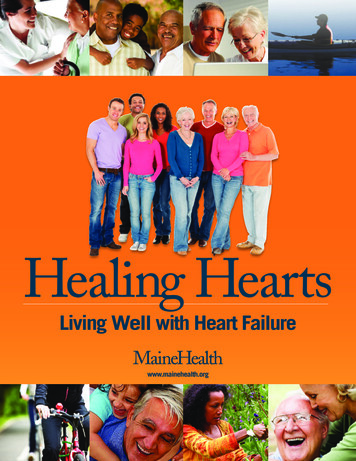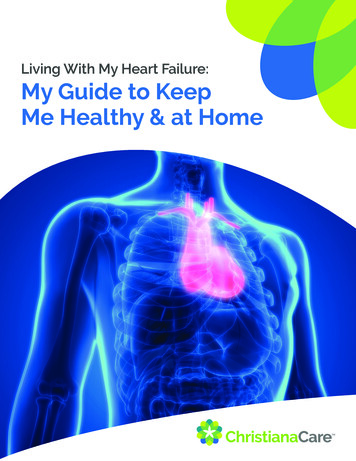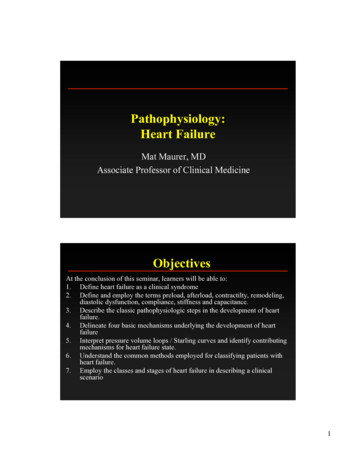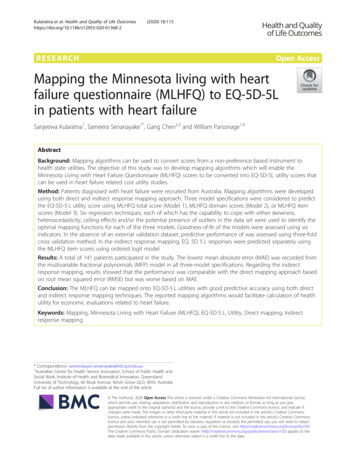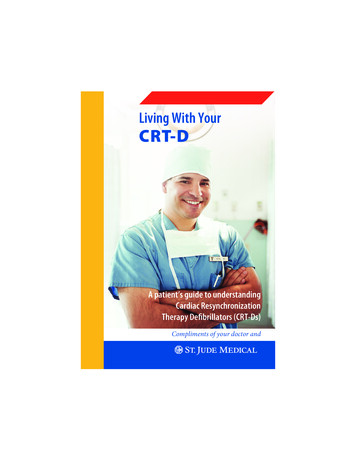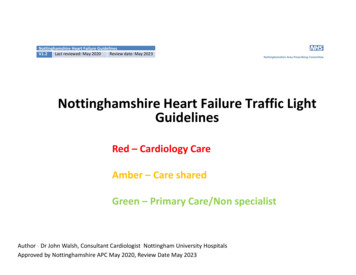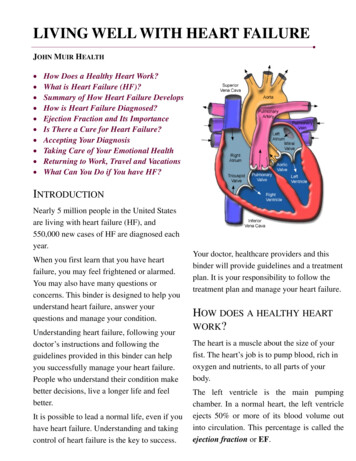
Transcription
LIVING WELL WITH HEART FAILUREJOHN MUIR HEALTH How Does a Healthy Heart Work?What is Heart Failure (HF)?Summary of How Heart Failure DevelopsHow is Heart Failure Diagnosed?Ejection Fraction and Its ImportanceIs There a Cure for Heart Failure?Accepting Your DiagnosisTaking Care of Your Emotional HealthReturning to Work, Travel and VacationsWhat Can You Do if You have HF?INTRODUCTIONNearly 5 million people in the United Statesare living with heart failure (HF), and550,000 new cases of HF are diagnosed eachyear.When you first learn that you have heartfailure, you may feel frightened or alarmed.You may also have many questions orconcerns. This binder is designed to help youunderstand heart failure, answer yourquestions and manage your condition.Understanding heart failure, following yourdoctor’s instructions and following theguidelines provided in this binder can helpyou successfully manage your heart failure.People who understand their condition makebetter decisions, live a longer life and feelbetter.It is possible to lead a normal life, even if youhave heart failure. Understanding and takingcontrol of heart failure is the key to success.Your doctor, healthcare providers and thisbinder will provide guidelines and a treatmentplan. It is your responsibility to follow thetreatment plan and manage your heart failure.HOW DOES A HEALTHY HEARTWORK?The heart is a muscle about the size of yourfist. The heart’s job is to pump blood, rich inoxygen and nutrients, to all parts of yourbody.The left ventricle is the main pumpingchamber. In a normal heart, the left ventricleejects 50% or more of its blood volume outinto circulation. This percentage is called theejection fraction or EF.
Page 2LIVING WELL WITH HEART FAILUREWHAT IS HEART FAILURE? Heart failure is not a disease. Heart failure is the name used to describe a set of symptoms. Heart failure is caused by diseases that affect the ability of the heart to pump blood.WHAT HAPPENS WITH HEARTFAILURE?Dilated CardiomyopathyThe term “heart failure” suggests that theheart has stopped working or has“failed”. This is not the case. What itactually means is that the heart is notworking as well as it should, and cannotpump enough blood to meet the body’sneeds.This happens because the heart isweakened by conditions or diseases thatdamage the heart muscle. Most of theseconditions weaken the heart little bylittle, over a period of time.CARDIOMYOPATHY is an enlarged heart. Withcardiomyopathy the heart does not pumpefficiently which can lead to heart failure.SUMMARY OF HOW HEART FAILURE DEVELOPSThe heart muscle is weakened by conditions or diseases that damage the heart. The heart’spumping action becomes less efficient. The body tries to compensate for the heart’s reducedpumping action by: Increasing hormonal stimulation Pumping faster Enlarging—the heart chambers stretch and enlarge and the muscle mass may increase insize.For a time, these adaptations will help continue normal or near-normal heart functions. Butsooner or later, these adjustments can actually make matters worse by putting extra strain on
Page 3LIVING WELL WITH HEART FAILUREWHAT CAUSES HEART FAILURE?CARDIOMYOPATHYis the general term for a heart that is enlarged or damaged by one of several diseases.Cardiomyopathy can be caused by coronary artery disease, valvular heart disease, viral orbacterial infections that attack the heart, drugs that damage the heart muscle, prolonged alcoholabuse, some metabolic diseases, as well as other causes.CORONARY ARTERY DISEASE (CAD) is the most common cause of heart failure. CADis a narrowing of the arteries that supply blood to the heart muscle. Cholesterol deposits clogthe arteries, decreasing the supply of blood and oxygen to the heart. This can weaken the heartmuscle. Opening the arteries may improve heart failure.CAD can result in a myocardial infarction or heart attack. A heart attack occurs when plaqueand clotting cause a complete blockage in a coronary artery. The heart muscle that wasreceiving blood from the blocked artery dies, causing permanent muscle damage. An enlargedheart from CAD or from a prior heart attack may be referred to as ischemic cardiomyopathy.Six out of every seven patients hospitalized with heart failure have a history of coronary arterydisease, and three out of four have a history of high blood pressure.HYPERTENSION (high blood pressure) is the second most common cause of heart failure.Long standing or poorly controlled blood pressure increases the workload of the heart. Overtime the high pressure causes the heart to enlarge and the muscle becomes thick and stiff.When this occurs the left ventricle cannot fill or pump normally. Long standing hypertension isA less efficient pump meansa less forceful ejection orpropulsion of blood intocirculation.Because the heart does notpump as effectively, thebody’s need for oxygen andnutrients may not be met.
Page 4LIVING WELL WITH HEART FAILUREWHAT CAUSES HEART FAILURE? (CONTINUED FROM PG. 3)VALVULAR HEART DISEASE is another common cause of heart failure. Heart valvescontrol the direction of blood flow through the heart. When valves are damaged they may notopen or close properly. Valves may become stiff (stenotic) or they may fail to close completely(insufficient) which can cause a back flow of blood (regurgitation). Either way, blood flowthrough the heart is impaired and the heart enlarges to compensate. This weakens the heartmuscle and heart failure develops. Surgical repair or replacement may correct or decrease theprogression of heart failure.OTHER CONDITIONS, some of which are temporary and treatable, can cause heart failure.These include: Arrhythmias (Irregular, fast or slow pulse—see page 6 ) Thyroid disease Pregnancy Obesity Unknown causes (idiopathic cardiomyopathy)RIGHT SIDED & LEFT SIDED HEART FAILUREWhen the right side of the heart is notpumping effectively, the blood returning tothe heart from the body backs up in theveins. Right sided heart failure causes abackup of blood coming into the heart.Symptoms of right sided heart failure:heart is not pumping blood forward wellenough, blood backs up, causing fluidaccumulation in the lungs. This is also calledcongestive heart failure. Decreased forwardblood flow results in less nourishment to thebody’s organs and tissues. Swelling in the liverSymptoms of left sided heart failure: Abdominal distention (bloating in thestomach) Fatigue Shortness of breathSwelling in the legs and ankles Weakness Cough The blood enters the left side of the heartfrom the lungs. When the left side of the
Page 5LIVING WELL WITH HEART FAILUREHOW IS HEART FAILURE DIAGNOSED?To make the diagnosis of heart failure the following should be done: Health History Physical Exam Chest X-Ray—to evaluate the size and shape of the heart and detect any fluid in thelungs. EKG—to determine heart rhythm and search for previous heart damage or thickenedheart muscle. Blood Test for BNP—a hormone made when the heart is overworked. Measure Ejection Fraction (EF)—to gauge effectiveness of the pumping action of theheart. The EF can be determined with an echocardiogram, nuclear scan or angiogram.An echocardiogram usesultrasound to determine the sizeof the chambers, the thickness ofthe heart muscle, the functioningof the heart valves and estimatethe ejection fraction.A chest x-rayshowing an enlargedheart with fluid inthe lungs.Fluid in the lungs:congestive heartfailure(Lungs shouldappear black)
Page 6LIVING WELL WITH HEART FAILUREEJECTION FRACTION AND ITS IMPORTANCEEjection Fraction (EF) is a key indicator of a healthy heart and is frequently used byphysicians to determine how well your heart is functioning as a pump. Ejection fraction isthe percentage of blood that is pumped out of the heart during each beat. In a healthy heart,50-75 percent of the blood is pumped out during each beat. Many people with heart diseasepump out less than 50% and many people with heart failure pump out less than 40%.Ejection fraction is one of the many ways doctors classify the type and severity of heartfailure and damage to the heart muscle.Ejection Fraction Ranges An ejection fraction above 50% indicates that your heart is pumping normally and is ableto deliver an adequate supply of blood to your body and brain. An ejection fraction that falls below 50% could indicate that the heart is no longerpumping efficiently and is not able to meet the body’s needs. An ejection fraction of 35% or less indicates a weakened heart muscle. The heart ispumping poorly, which can significantly increase a person’s risk for sudden cardiacarrest.Measuring Your Ejection FractionFor heart failure patients, knowing your ejection fraction is just as important as knowingyour blood pressure and your cholesterol. Ejection fraction is often measured using an echocardiogram, a simple and painless test often performed right in the doctor’s office. Ejectionfaction can also be measured with other tests including: Echocardiography Cardiac catheterization Exercise stress echocardiography Nuclear stress testing
Page 7LIVING WELL WITH HEART FAILUREA Low Ejection Fraction is a Serious Health RiskRecent medical research shows that people with an ejection fraction of 35% or lower may beat increased risk for Sudden Cardiac Arrest. Sudden Cardiac Arrest is not a heart attack.Sudden cardiac arrest occurs when your heart suddenly starts beating very fast and quiveringinstead of pumping blood to the body and brain. If untreated, Sudden Cardiac Arrest can leadto death within minutes. If you have a low ejection fraction, your doctor may prescribemedications, recommend lifestyle adjustments or suggest other therapies.Treatment Options: Hope and Protection from Sudden Cardiac ArrestThe good news is there are several options that can help reduce the risk for sudden cardiacarrest. A heart-healthy lifestyle is one. Keeping your heart healthy includes regular exercise,healthful eating, weight management and not smoking Medical therapies play an important role in addressing the underlying medical conditionsthat can lead to sudden cardiac arrest. For patients with heart failure clinical studies havedemonstrated certain classes of drugs, including beta blockers and ACE inhibitors, canreduce the risk of sudden cardiac arrest. Medical devices can be implanted in certain high risk patients. An Implantable CardiacDefibrillator (ICD) is a device that detects a heart rhythm that may be dangerous anddelivers an electrical shock to restore normal rhythmImplantable DefibrillatorKnow your Ejection Fraction number and talk to your doctor. Only your doctor candetermine your Sudden Cardiac Arrest risk and treatment options for your condition.
Page 8LIVING WELL WITH HEART FAILUREAN ELECTROCARDIOGRAM (EKG) SHOWS THE ELECTRICALPATHWAYS IN YOUR HEART AND THE PATTERN OF YOUR HEARTBEAT.The heart’s electricalsystem generates thepulse or heart beat. Anelectrical impulsetravels through theheart muscle causingthe muscle to contract.ATRIAL FIBRILLATIONAtrial fibrillation is an irregular heart rhythm (arrhythmia) originating in the upper chambers(atria) of the heart. Normally, the heart beats in a strong, steady rhythm. In atrial fibrillation, aproblem with the heart’s electrical system causes the atria to quiver, or fibrillate. The quiveringupsets the normal rhythm between the atria and the lower chambers (ventricles) of the heart.As a result, the heart can not pump as well.A less efficient pump means a less forceful ejection orpropulsion of blood into circulation. Because the heartdoes not pump as effectively, the body’s need for oxygenand nutrients may not be met.Atrial FibrillationNormal Rhythm
Page 9LIVING WELL WITH HEART FAILUREIS THERE A CURE FOR HEART FAILURE?Heart failure is a chronic condition that in most cases cannot be cured; however, it can bemanaged. For most people with heart failure, management means SELF MANAGEMENTtaking medications and making positive lifestyle changes.YOUR CARE TEAMMany people will work together to help you live better with heart failure.Your primary care provider: This is the person you usually see for health problems. Yourprimary care provider can be a family practice physician, a general internist, a nursepractitioner or a physician assistant.Your cardiologist: This is a physician specializing in the diagnosis and treatment of heart andblood vessel diseases.John Muir Heart Failure Tel-Assurance Program: This is a free program offered topatients who receive care at John Muir. The program uses daily telephone monitoring to keepyour doctor informed of your progress. (For more information see reference section).Other health care professionals: Many other professionals including nurses, dieticians,pharmacists, rehab specialists, care managers and social workers may contribute to differentaspects of your care.You and your family: You and your family are at the center of this team! You need to beactive participants in your care. This means learning as much as you can about your condition,following your treatment plan and communicating with the rest of your health care team.ACCEPTING YOUR DIAGNOSISAs you try to understand and accept what itmeans to have heart failure, you’ll probablyfeel a range of emotions. Your outlook on thefuture may also change, depending on yourprognosis. Heart failure can be mild or severe,and people respond differently to treatment.For some people, heart failure symptoms arereversible with proper treatment, yet forothers, symptoms get worse over time.Managing your feelings is an important aspectof your care. The following are normalemotional stages after a diagnosis of HF:Your initial reactionYour initial reaction may be shock, disbelief,denial or numbness. For the first few months,you may have a hard time acknowledgingyour condition. It’s tough to be told you haveheart failure.
Page 10LIVING WELL WITH HEART FAILUREAdjusting to your conditionFor 3-12 months after your diagnosis, youmay experience preoccupation, fear, anxietyor anger. You may struggle to integrate newroutines into your daily life. From questionsof “why me?” to “what if” you will probablymove toward more acceptance of yourcondition.Throughout these emotional stages, be patientwith yourself. Adjusting to life with HF ischallenging, but many people have learned toaccept their diagnosis and to lead lives filledwith a renewed sense of purpose andhopefulness. With time, support and patience,you can too.New habits become routineWhen new habits become routine and yourunderstanding of heart failure improves,you’ll probably begin to feel more peacefulabout your diagnosis. You may getsatisfaction from the adjustments you’vemade in your life and feel new resolve aboutthe future.TAKING CARE OF YOUR EMOTIONAL HEALTHYour diagnosis of heart failure, your symptoms and your concern for the future may cause youand your loved ones to feel depressed or worried. Your concerns are normal. As you begin takingcharge of your health and making positive changes, you may find these feelings start to fade.However, if negative feelings continue and interfere with your ability to enjoy life, talk to yourdoctor. Counseling might help you feel better.RECOGNIZING DEPRESSION AND ANXIETYEveryone feels anxious or blue some of the time. But if these feelings persist and they interferewith your ability to do and enjoy daily activities, or if your relationships are affected, you shouldseek help. People who are depressed often feel tired and have no energy. They may lose interestin sex, have trouble sleeping and lose their appetite. Although fatigue and loss of appetite arealso common symptoms of heart failure, they are more likely due to depression if accompaniedby any of the symptoms listed on the next page.
Page 11LIVING WELL WITH HEART FAILUREYou may be depressed if you have any of the following symptoms for more than 2 weeks: Excessive sleepiness Down mood Feeling worthless or guilty Feeling blue Hopelessness Irritability Suicidal feelings Loss of interest in things you used to enjoy Preoccupation with death Withdrawal from othersYou may be anxious if you have any of the following symptoms for more than two weeks: Excessive worry Fear Tension Feeling keyed up or always on edge Restlessness Feeling shakyMany people in our society feel there is some stigma associated with having emotionalproblems like depression or anxiety. As a result, they may be reluctant to talk to anyone abouthow they are feeling. However, having emotional problems is nothing to be ashamed about. Itis important to recognize and treat depression and anxiety. If you are having difficulty copingwith feelings about heart failure, you should seek help and support. In other words, ifdepression and anxiety are interfering with your life or causing distress, it is important for youto seek help from your doctor or nurse.TIPS TO HELP YOU DEAL WITH EMOTIONAL BLUES Get out and walk every day Get dressed every day Keep up with activities or hobbies you enjoy Share your feelings with your spouse, a friend orclergy member Get a good night’s sleep Follow your treatment plan
Page 12LIVING WELL WITH HEART FAILURECONSERVE YOUR ENERGYUsing less energy with daily tasks can help you have more energy to do more activities duringthe day. You may need to cut down on some of your activities or use energy-saving devices ortechniques. If daily self-care or home care activities are too tiring, discuss this with you doctor.Here are some energy saving tips: Simplify your tasks and set realistic goals. Plan activities (chores, exercise andrecreation) ahead of time. Do not scheduletoo many things to do in one day. Dothings that take more energy when you arefeeling your best.Avoid extreme physical activity. Do notpush, pull or lift heavy objects (more than10 pounds) that require you to strain. For more energy-saving tips, tell yourdoctor you would like to speak to anoccupational therapist or cardiacconditioning specialist. If necessary, rest before and afteractivities. When you rest, keep your feetup to keep the swelling down. If you become tired, stop and rest. Youmay need to finish on another day or whenyou feel less tired. Do not plan activities right after a meal. Get a good night’s sleep. Ask for help. Divide tasks among familyand friends. Use devices and tools such as a walker,shower chair, hand-held shower head orbedside commode. Do all of your grooming (shaving, dryingyour hair, etc.) while sitting. Arrange your activities so you do not haveto climb up and down stairs many times.
Page 13LIVING WELL WITH HEART FAILURERETURNING TO WORKIf you have been in the hospital for your heart failure, your doctor will tell you how soonyou can return to work. You may need to change some of your job related activities. Thismay involve job re-training or taking disability.Talk to your doctor about the type of job you have. Your doctor can help you decide if yourjob will affect your heart condition and if you need to make changes.TRAVELING AND VACATIONSYou may travel as soon as you are feeling better, but always let your health care providerknow when you plan to go and provide a phone number where you can be reached.By following these traveling tips, your vacation will be worry free: Always take all of your medications with you and make sure you have enoughmedications to last throughout your trip. If you are traveling by plane, carry your medications with you. Never check them withyour luggage. You may need a letter from your health care provider that verifies all ofyour medications, especially if you are traveling internationally. Pack this letter with yourmedications. Consider wearing an Emergency Medical Identification band. Make sure you have your doctor’s phone number. Be careful to avoid infection when traveling. In areas where the water might be unsafe,drink bottled water or other beverages (order beverages without ice). Swim only inchlorinated pools. Select food and drink with care to avoid illness. It is easy to overeat and to take in toomuch sodium when you are away from home, especially while eating meals atrestaurants.
Page 14LIVING WELL WITH HEART FAILUREWHAT CAN YOU DO IF YOU HAVE HEART FAILURE?Heart failure is a serious disorder and isusually a chronic illness. Many forms ofheart failure can be controlled withmedication, lifestyle change andcorrection of any underlying disorder. Thesuccess of your treatment plan dependson your active involvement. Monitor your symptoms every day Ask your doctor about drinkingalcohol Control your body weight Get regular physical activity Quit smokingFollowing your treatment plan can makeyou feel better, prevent your heart failurefrom getting worse and help you livelonger. Know your ejection fractionnumber Learn when to consult yourdoctor or nurseWHAT YOU CAN DOThis binder is designed to helpyou take control of your heartfailure. Your doctor and the health careproviders at John Muir Health will helpyou manage your heart failure. We arededicated to your success. Take your medicines exactly asdirected Weigh yourself every day to see if youare retaining fluid Follow a low sodium (low salt) diet
are living with heart failure (HF), and 550,000 new cases of HF are diagnosed each year. When you first learn that you have heart failure, you may feel frightened or alarmed. You may also have many questions or concerns. This binder is designed to help you understand heart failure, answer your questions and manage your condition.
